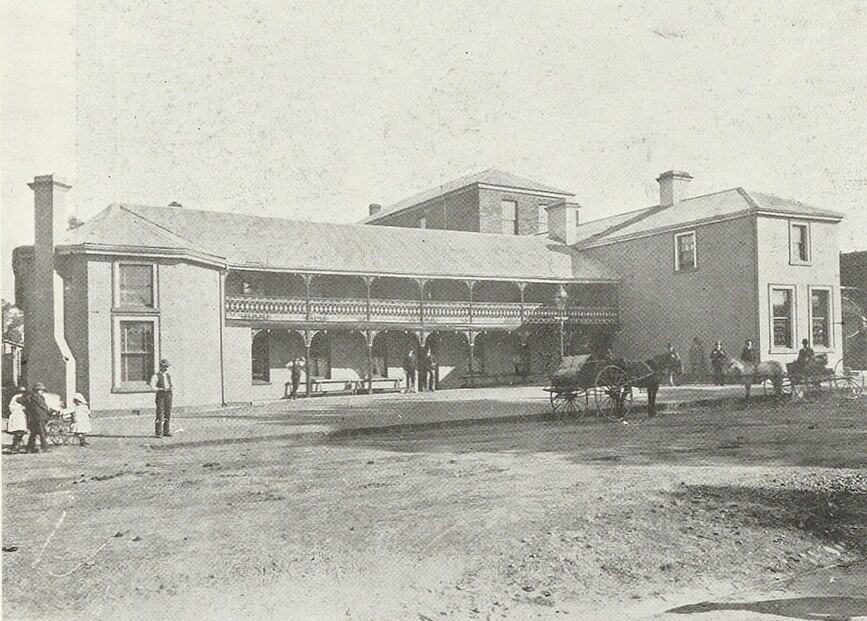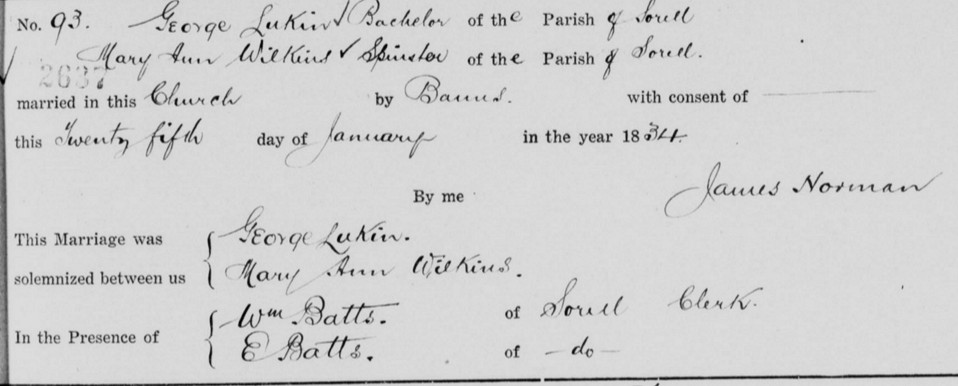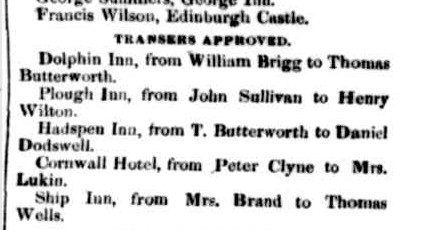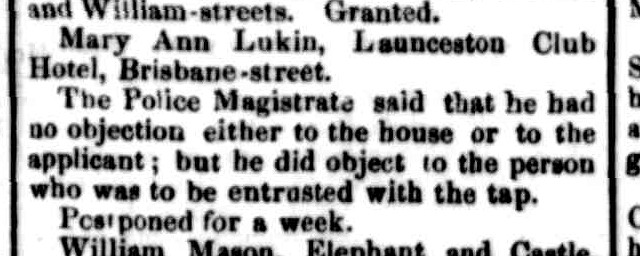Mary Ann Lukin was a brewery owner, and landlady (licensee) of two of Launceston’s leading hotels.
From her death certificate, she was born in England, about 1813. So she was about 21 when she married George Lukin in Sorell, naer Hobart.
A few years later, they were living in Hobart where they established a brewery. Unfortunately, in 1849 George died of lung disease, leaving Mary Ann with seven children to raise.
The remains of the late Mr. George Lukin, of the “Wharf House Brewery,” were interred on Tuesday in the Episcopalian burial-ground. The deceased was followed from his residence to the grave by about 100 persons, the greater majority of whom attended without invitation, to testify their respect to his memory. The deceased had been a resident of Launceston above 18 years, and was universally esteemed, by all who knew him ; he was a man of unimpeachable integrity, and of strict rectitude of conduct.
Cornwall Chronicle, 17 November 1849

Cornwall Chronicle, 2 January 1850
From here, I’ll mostly let the articled and advertisements tell their own story. Some show the changes in Mary Ann’s life i.e. license transfers. Some are just interesting or representative of what was going on.
AN IMPUDENT ABSCONDER.-A man. named Marks. absconded in: the month of November, last year, from. the service of Mrs. Lukin, of the Wharf Brewery, Launceston, and arrived in this city, not many days back;, when he took up his quarters at Mrs. Barnes’ house for a couple of nights, “representing himself to be somebody,” and procured two valuable gold rings, under false pretences, saying he wanted them for a certain lady of “an uncertain age.” There was, however, no case of such a nature preferred against him, and when tried at the police court on the 14th instant, before Messrs. Wilmot and Hilddlestone, he was charged by detective constable Simpson with absconding only, and sentenced to have his term of transportation extended six months, and to be kept six months on probation.-H. T. Advertiser
Launceston Examiner, 22 January 1851
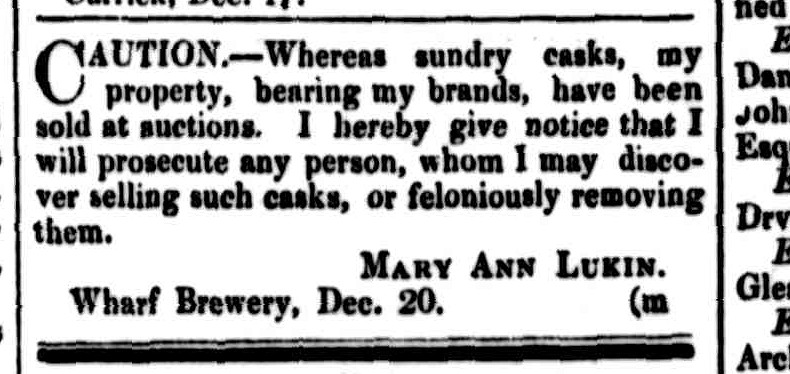
Cornwall Chronicle, 20 December 1851
Another Inquest was held on Friday after noon, at the “Wharf House,” before M. Kennedy, Esq, to enquire into the death of Patrick Kick, a man in the employ of Mrs Lukin.
Edward M’Mahon being sworn, deposed to being in the deceased’s company on the afternoon of Thursday and that he accompanied him up into the brewery ; the deceased found some thing wrong about the pipe of the vat and said he should go into it, to see what was the mat ter; witness tried to persuade him not to go down, but he would, After deceased being down some few minutes, witness called out to him, but receiving no answer he became alarm ? ed, and ran down into the yard for assistance. Mr. Towner was at the end of the yard, and immediately went up to render assistance : some of the other men belonging to the brewery also came. One man descended, but was so overpowered as to be obliged to be dragged back ; a rope was then procured, and with much difficulty deceased’s body was drawn out–he was quite dead.
Mr. Thomas Towner deposed to seeing last witness running about the yard apparently alarmed, and went to inquire the cause, upon learning which ha vent up into the brewery and found that deceased was in the vat. other men then fame, m& after two attempts the body was drawn forth.
The evidence of an other witness was to the same effect. Dr. Graham deposed to the appearance of the deceased person to be that which would be produced by suffocation ; had no doubt but that deceased met his death from the noxious vapour in the vat.
The jury accordingly returned a verdict of accidentally suffocated by mephitic vapour.
Cornwall Chronicle, 27 December 1851
DESTRUCTIVE FIRE
The most destructive fire that ever occurred in Launceston, if not in the colony, took place between twelve and one o’clock this morning, and terminated in the entire destruction of the extensive and valuable premises on the wharf, known as Reid’s Stores, the property of Mr R H M’Kenzie, the premises of Captain Pryde, ship-chandler, Mrs Lukin’s brewery, dwelling-house, and out-buildings, the large inn, known as the Wharf House, kept by Mr E Humphries, and the premises of Mr G Fisher, together with nearly the whole of the valuable property contained in the various buildings.
The fire broke out about half an hour after mid night, and the general account given of its origin is, that a man in the employ of Mrs Lukin, who was in the stable at the rear of the brewery, having lighted his pipe, threw the match down on some straw, and the building was immediately in a blaze. The fire speedily extended to the brewery, and for nearly twenty minutes was kept under by the efforts of Mr Scott, Mrs Lukin’s brewer, and other persons on the premises; but as no water was immediately at hand, or rather as there were no speedy means of making a supply from a well on the premises available, the fire soon obtained an ascendancy which it was impossible to control.
The flames next extended to the marine store of Captain Pryde, and having caught some bales of hay between that and Mr M’Kenzie’s large stores, the roof of the latter ignited, and the fire soon obtained a hold on the entire building. On the other side of the brewery the fire extended to Mr Humphries’ and Mr Fisher’s, the office and part of the dwelling-house of the latter only escaping, whilst his store and out-buildings were destroyed.
Some considerable time elapsed before the alarm was given by the ringing of the bells, and then the fire engines, bodies of soldiers and police, and persons from all parts of the town hastened to the spot, but so rapid had been the progress of the fire, and so little water was to be got, (it was low water) that no effectual efforts towards saving the premises could be made. In the store of Mr M’Kenzie were a variety of goods belonging to Messrs Thompson, Mackenzie, Pott, and others, but owing to the delay in procuring an entrance, everything but a few bags of flour was destroyed. Nothing but the walls of the building remain, and these are so cracked that they will be immediately pulled down to prevent accidents. Captain Pryde who had just commenced business, saved a considerable portion of his stock.
Nearly all the property of Mrs Lukin and Mr Humphries was destroyed; nothing but the walls of the buildings remaining. Mr Fisher saved a portion of the contents of his stores, house and office. Several other persons have also lost property. The residence of the harbour master, and other houses in the neighbourhood were saved by putting wet cloths on the roofs.
The loss is variously estimated, by some at £30,000. It is divided among the different offices, but the amount insured we have not yet been able to ascertain.
Examiner, 5 March 1853
A Looker-On objects to the story as reported.
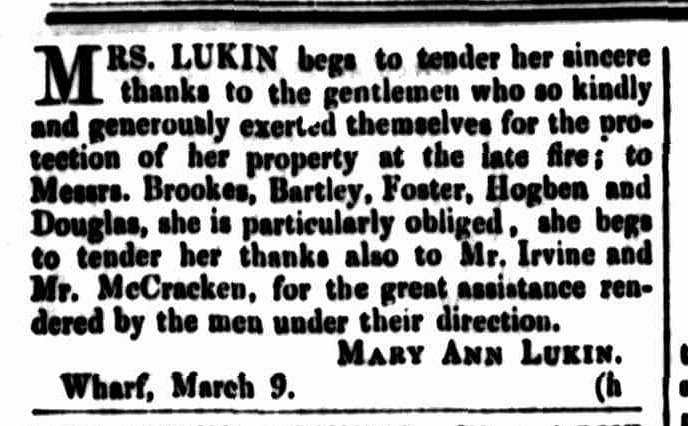
Cornwall Chronicle, 9 March 1853

Cornwall Chronicle, 7 May 1853
We are much pleased to notice that steam power is being made available to business establishments in this town. A year or two ago the engine of the Messrs. Thompsons was the only one here ; there are now several ; — Mr. Thomas Button has just got one into operation — Mr. Stewart, the coach-builder, has one — Mrs. Lukin was about erecting one when the fire occurred on her premises. We have also one applied to a printing machine on this establishment, and from the very great advantages derived from them in the present scarcity of labor, there is no doubt their number will fast increase.
Cornwall Chronicle, 2 April 1853
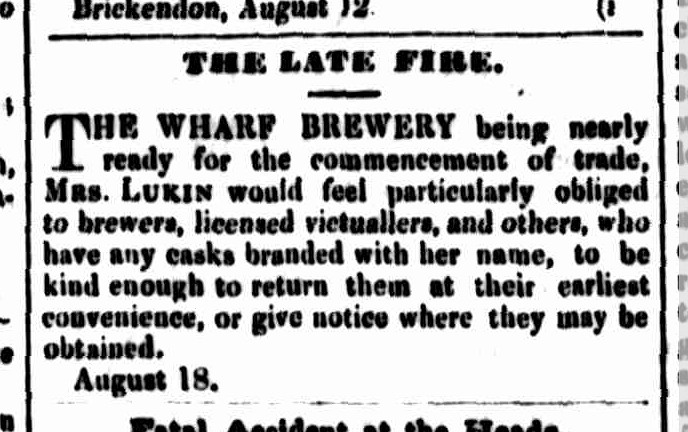
Cornwall Chronicle, 27 August 1853
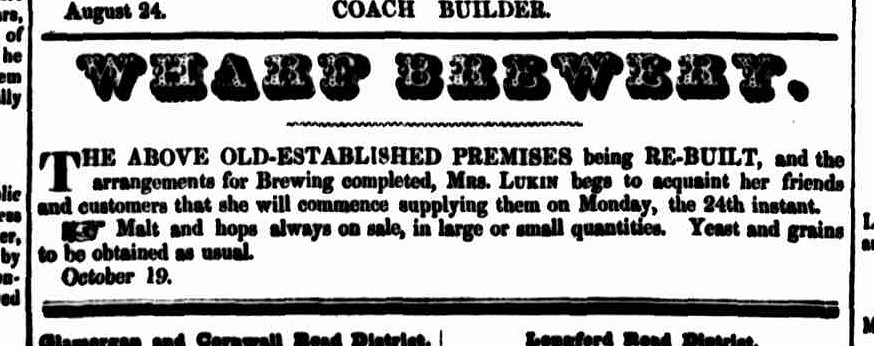
Cornwall Chronicle, 22 October 1853
A meeting of the Municipal Council was held on Thursday to consider the appeals from the assessment. There were only four. Mrs. Lukin appealed against the assessment of her new dwelling house on the Wharf, on the ground that it was incomplete and not first for occupation. The rate was, however, confirmed.
15 April 1854
M Black, M. White, Mrs. Lukin, H. Marshall, Wm. King, and several others, were fined in sums varying from 12s. 6d. to £1 17s. 6d. for allowing cows, horses, and pigs, to be at large in the different streets of the town.
Cornwall Chronicle, 31 May 1854
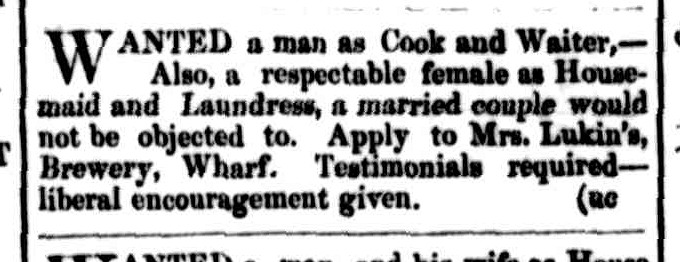
Cornwall Chronicle, 27 December 1854
COURT OF REQUESTS.
Tuesday, May 1st, 1855.
(Before Commissioner J. C. Gregson, Esq.)
Scott v. Lukin.
Jurors— John Atkinson, Wm. Birch, Rout. De Little, and James Peters, Esqs.
Mr. William Henty appeared for plaintiff, and Mr. A. Douglas for defendant.
This claim was for one month’s salary; £20 16s. 6d. but included a breach of contract between the parties, Mr. John Scott and Mrs. Mary Ann Lukin, by which plaintiff was to have served in the capacity of brewer, malt ster, and clerk, at the salary of £250 per annum for two years, at the expiration of which, he was to be admitted a partner in the business. The cause of disagreement between the parties evidently was, Mr. Scott’s refusal to admit Mr. George Lukin, son of defendant, to learn the business of a brewer, without his (Mr. Scott’s) being allowed any control over him, in consequence of which Mr. Lukin was apprenticed, at great expense, to Mr. Pascoe at Hobart Town.
The case for the defendant was ably conducted by Mr. Adye Douglas : he, in fact, turned the plaintiff into defendant, who, having but feeble support from Mr. Henty, got rather the worst of it. After the greater part of the day had been occupied in examining the plaintiff and defendant, Mr. J. T. S. Jones, who was employed to correct the books, Francis Mclvor, an apprentice, and George Storey, a maltster.
The Chairman stated to the jury that plain tiff, being employed to act, with due diligence skill and knowledge as brewer, maltster, and clerk, what they had to try was, whether plaintiff was entitled to his wages ? Did the evidence show that he had used such skill, &c, as ought to be expected from him ? He admits that he did not profess to be a very good book-keeper, but one of the clauses in the agreement is, that he shall keep a correct account of stock, &c., &c, &c. The question in not whether he failed in one point or two, or whether be made mistakes, but was he possessed of sufficient capabilities, to under take all the duties named in the agreement ? Is he, in fact, entitled to the amount he claims ?
Judgment for the defendant.
Cornwall Chronicle, 5 May 1855
FORGERY.—A man named Thos. Butterworth, from the service of Mrs. Lukin, is in custody since Monday, charged with uttering a forged cheque for £5 16s. to Mr. Wm. Bryant, of the Market House Tavern, on Saturday night last. The cheque purports to be drawn on the Union Bank of Australia by Mrs. M. A. Lukin. Butterworth states that he received it from a man named Storey in the same service : Storey has absconded, and warrants have been issued by the Police Magistrate for his apprehension.
Cornwall Chronicle, 2 June 1855
A Business Trip?. A few days ago Sergeants East and Bennett escorted some prisoners to Hobart Town, and whilst there accidentally met, recognised, and arrested a man named Storey, charged with forging a check for £6 on Mrs. Lukin; and another named Maloney, who about four years since was fined £50 for keeping a sly grog-shop in St. John-street, and who absconded immediately, and has been at large ever since.
The Courier, 13 June 1855
The Cornwall Hotel (pictured at the top of the page) was one of the first hotels built in Launceston. At the time Mary Ann took over, it was thirty years old and was starting to get a bit tired around the edge, but it still fulfilled its original function of providing respectable accommodation for visitors to the town, as well offering needed space for meetings and large gatherings. (It also features here.)
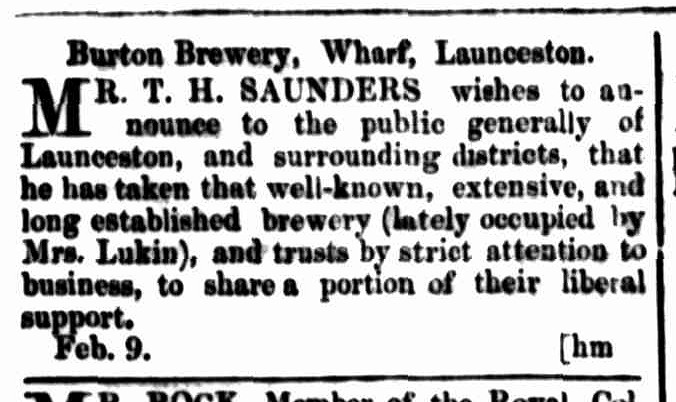
Cornwall Chronicle, 9 February 1856
MASTER AND SERVANT ACT.-Samuel Brown, alias Paget, a smartly dressed and strongly perfumed person, lately waiter at the Cornwall Hotel, appeared at the police office on Tuesday to claim the sum of 25l. 10s., being the amount of wages due to him by Mrs. Lukin. Mr. Rocher appeared for complainant, and Mr. Miller for the de fence. The fact of the complainant having been in Mrs. Lukin’s service and the amount being due having been proved, Mr. Miller subjected Brown to a cross-exanimation, with a view to show that the complainant, as head waiter at the hotel, had charge of the grocer’s order book, and was in the habit of obtaining and issuing the stores used daily, such as tea, coffee, candles, &c. Complainant was also examined as to the enormous and extravagant consumption of those articles, as shown by the quantities obtained front the grocer, and also as to whether he (Brown) had not absented himself from his service. The complainant denied or evaded these questions, and Mr. Miller said that Mrs. Lukin had found that the complainant was what was technically called at “weeder,” and that the quantities of several articles obtained from the grocer exceeded by a half and even three times as much those actually consumed in the establishment, and on these grounds she had on his absenting himself refused to let him come back, and declined to pay his wages until the facts of the case were brought before a court.
[continued]
Examiner, 25 September 1856
THE VICE REGAL BALL AT LAUNCESTON.
The ball given by Sir Henry and Lady Young took place at the Cornwall Assembly Room on Thursday evening. Over three hundred invitations had been issued we believe ; and about 200 ladies and gentlemen attended. The upper rooms; occupied by the Masonic Lodge, were converted into supper and card rooms. Dancing commenced at about ten o’clock, and continued to twelve, when the company proceeded to supper. The ball concluded’ at two o’clock, and seems to have given great satisfaction; although, some dissatisfaction has been expressed at what is called the mixture of latitude and exclusiveness in the invitations. Some persons who’ were invited to government balls before were omitted on this occasion and vice versa. However, it is impossible to give perfect satis faction in such, cases. Lady. Young was pleased to express to Mrs. Lukin hersatisfaction with the manner in which the supper and: other arrangements were -effected. The German-band was employed.
Tasmanian Daily News, 23 December 1856
POLICE COURT
(Before W. Gunn and C. J. Weedon, Esqrs.)
O’Connor v. Lukin.-This was an information charging Mrs. Lukin, of the Cornwall Hotel, with an Infringment of the Act, 6 Vict., No. 5, by permitting a dramatic entertainment to be given in the Cornwall Assembly Rooms. The bench inflicted the lowest penalty, 5s. and costs.
Examiner, 23 November 1858
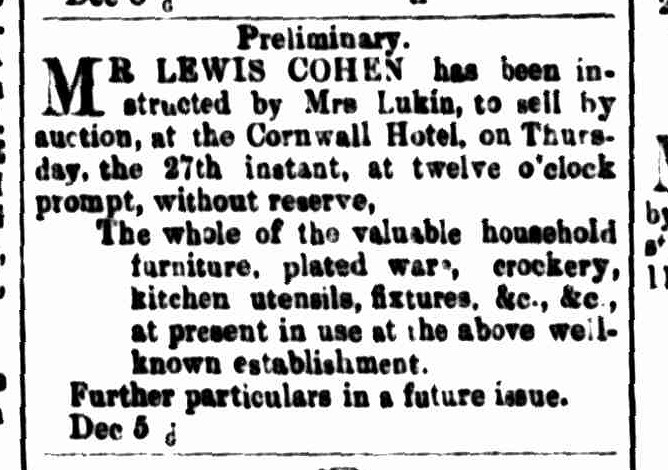
Cornwall Chronicle, 8 December 1860
This is a very long image with the room by room inventory of the hotel contents.
The Club Hotel was a newer establishment, having been developed only a few years earlier. From a contemporary description: it is in many respects peculiarly fitted for the reception of families and individuals from the other colonies intending to make a prolonged stay in the town. Besides the public rooms, there are several suites of private apartments, conveniently arranged and handsomely furnished, together with dining hall, billiard room etc.

Cornwall Chronicle, 12 December 1860
Breach of the Licensed Victuallers Act.
Mrs. Mary Ann Lukin pleaded guilty to the charge of having failed to keep a light burning in front of her licensed house, the Club Hotel, during the night of the 25th instant. She stated that the lamp was at a considerable height and admitted the wind, by which the light was extinguished, although it was re-lit several times. The Police Magistrate remarked that the omission on Mrs. Lukin’s part was of constant occurrence, and could no longer be overlooked. A fine of 10s and costs, 7s 6d, was inflicted.
Examiner, 1 September 1864

Cornwall Chronicle, 10 February 1866
At least two of Mary Ann’s sons were living in Queensland by now, so I assume she moved there to be closer to them.

Queensland Times, 6 February 1869
OLD CLUB HOTEL
The Last of a Landmark Unkind to Lessees With the sale of the old Australia Hotel property in Brisbane-street, and its probable demolition at an early date, it is interesting to recall some of the building’s history, which is so closely associated with the story of Launceston’s early days. For years the structure has stood as more or less an eyesore in the centre of the city, time and neglect having taken toll of its appearance and utility. Of recent years it has been used spasmodically, some of its flats having been occupied, but it never enjoyed any extensive or payable patronage of late, and presumably to spend sufficient money to bring it up to the standard required in modern residences did not appeal as a business proposition.
It was erected in the fifties of last century as a club house for the officers of the 99th Regiment, and sometime within the next ten years it was converted into an hotel, and named the Club. Its first rush of popularity came about 1862, when Mrs. Lukin, who at the time had the Cornwall Hotel, left there for the Club, and with her went the stage coach terminal. Page’s coaches had made the Cornwall their headquarters, with a consequent improvement in business from the travelling public, but with the removal to the Club the Cornwall received a substantial setback, and the Club gained thereby. Another thing that helped to popularise the Club was the provision of rooms for social gatherings, accommodation of the kind required for entertaining outside homes being in those days very scarce.
[continued]
Examiner, 26 June 1930
